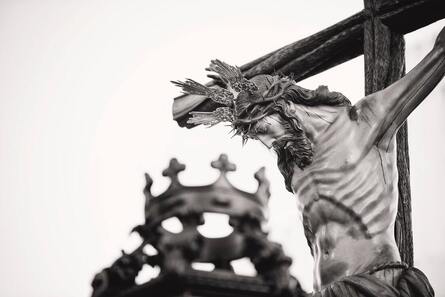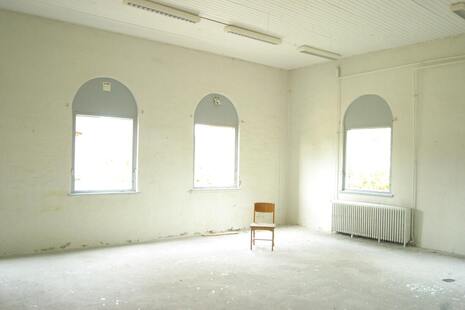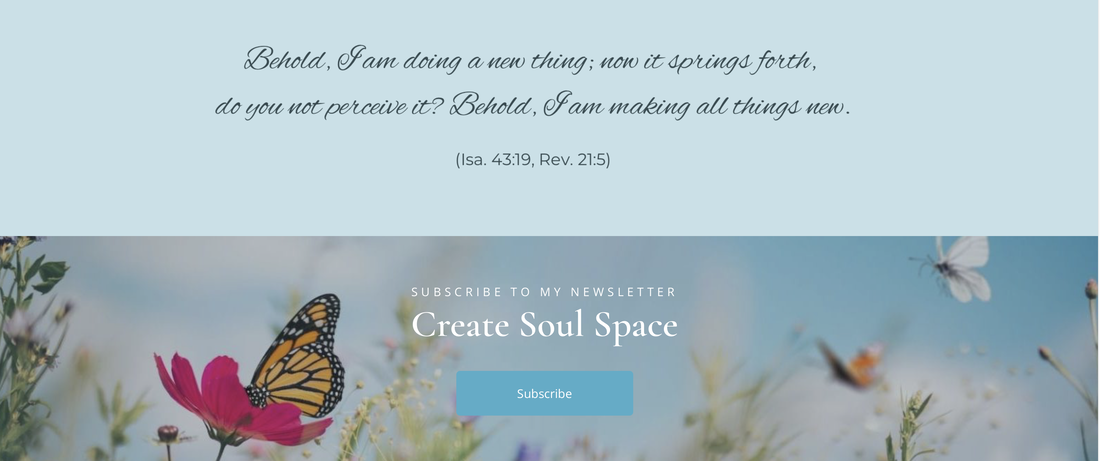|
We know by now that the most important thing we can do to help us grow on the sacred path is to align our personal will with God’s will. We know the steps we need to take which will help us achieve this: Ask for God’s graces and divine wisdom; release the barriers of the surface-self which stand in our way so we can more fully understand our spiritual path; surrender into God, which naturally leads to a desire to act by carrying His sacred essence into the world for the edification and peace of others. But let’s face it—we’re going to mess up. A lot. It happens, not every so often but daily, usually several times a day. We all have shadow sides, parts of us that are more difficult to release than others. As we travel the spiritual path of ask, release, surrender, and act, we don’t leave each stage behind as we progress, but we take them with us as new spiritual tools. The cycle of ask, release, surrender, and act is continuous, an ebb and flow which isn’t necessarily linear. Sometimes we need to release before we even know how to ask. At other times—and more often than not--act comes into play multiple times. Each step will appear within the time and order necessary for your complete, unique transformation. Again, this takes practice, and we’ll often fall out of spiritual alignment. We know we’re out of alignment when we experience fear and frustration, panic and stress; when we allow ourselves to be abused or to abuse others. Yet for each time we find ourselves off kilter, we’re given an instant opportunity to realign. The more we adjust —the more we struggle and practice and triumph—the straighter we become. How do we achieve inner alignment, and how do we maintain it? Our quest isn’t flawlessness—if it was, we’d fall flat on our foreheads before our first step. Rather, our goal is attaining the highest levels we possibly can, which are those inspired and guided by Divine Will, designed specifically for our unique life’s path. In order to seek this place of alignment, this inner soul space, we must constantly seek a balance between our true selves and our understanding of the gifts and graces of the Holy Spirit. Soul space is a place we return to, again and again, each time we find ourselves falling out of alignment with God’s will. It’s a re-centering, a regrouping, a reconfiguration of spirit to Spirit. We must unify ourselves with God, creating this inner refuge of peace and tranquility no matter what the world outside is doing. When we allow our souls to expand and grow in unity with the Holy Spirit, suffering becomes sacred and joys are tempered with a knowledge that everything we have—indeed, everything we are—is a gracious gift from God. The inclination of the surface-self to become attached to both things and emotions will disappear, replaced with the memory of God’s blessings, a true understanding of our spiritual selves, and a surrender of our personal will into the Divine Will of God. When we experience Divine Alignment, we follow the will of God through a natural extension of our true beinghood. That deep inner Voice, most often called intuition, becomes bolder and more confident. We learn to want only what God wants, which is our highest good—regardless of the form that highest good may take. When challenges and tragedy strike, people often have difficulty with this teaching. I won’t go into much detail now, since the theme of next week’s installment is Sacred Suffering (a topic which may sound intimidating, but is actually quite beautiful). In brief I will say that it’s through challenges that we develop the spiritual stamina to incorporate deeper insights and intuitions into our daily lives. It’s through challenges that the voice of Spirit speaks to us, and it’s by honing our spiritual hearing that we allow the Voice to grow louder and bolder as we open ourselves to receive more profound guidance. By traveling these interchanging steps of ask, release, surrender, and act, we align the powers of our soul to the point that our will is balanced with Divine Will, and we begin to desire the same thing God desires—that we be made holy. What does it mean to be “made holy”? It sounds a bit medieval-esque to me, with hints of incense and candle wax. Yet although our vocabulary has necessarily changed with the times (for example, plagose is no longer used in everyday conversation, likely because general society is no longer fond of flogging), to be “made holy” is simply to be in alignment with Divine Will. The steps we’ve encountered up to this point have led us to this place of bliss. Of course, traversing these steps takes time—years, a lifetime even—and can’t be accomplished in just a few weeks. Even so, you hopefully now have a formula, a basis and a structure, something to lean on as you travel your divinely-guided path. Remember that patience is the sustaining Light guiding us toward progression. When we feel the need to rush—to push, pull, or prod things into our expected rhythms and mindsets—we’ll inevitably cause misalignment. What does it me to be "made holy"? It takes patience and persistence to accomplish goals, no matter what they may be. No one can expect to be a world-class surgeon after one year of med school, or even a few years of residency. It takes repetition, practice, constant vigilance and a desire to always increase our knowledge in order to become adept in any field. This is as true for the spiritual journey as it is for other aspects of life. We can’t expect to undergo radical transformation in only forty days. It could happen, but most often those forty days are preparation for a gradual unfolding of spiritual development, an unfolding which takes place over the course of our lifetimes. Those who lack the sacred awareness of patience lack the development and stamina needed to proceed. They’re the ones who always feel as if “something is missing,” a void they can’t quite fill no matter how much external stuff they add to their lives (which does more harm than good, because it creates more blocks). They’re always searching for that new solution, yet all those new “secrets” never last, and are soon replaced by something else. Why? Because true spiritual change takes an internal shift, a patient diligence, a deep understanding of the self as it exists within the palm of God’s embrace. It’s easy to lose patience, both with ourselves and with others. This week, try to remember that patience truly is a virtue. When you find yourself losing Divine Alignment, try to re-center by calling to mind the sacred soul space within, the part of yourself that has been “made in God’s image” and that shares in the promises of Christ. Prayer ... In a Nutshell:
Wherever You take me, I willingly go. No matter the path, regardless of the place, here I’ll be. And always, led by Your Light, it shall be in a place of peace, because it’s a place of Your will. Amen. Inspirational quotes for the week: “God pours himself into the soul, and the light at the core of the soul grows so strong that it spills out, radiates through the soul’s agents, even passing outward to man ... The light in the soul’s core overflows into the body, which becomes radiant with it.” (Meister Eckhart) “The intuitive mind is a sacred gift and the rational mind is a faithful servant. We have created a society that honors the servant and has forgotten the gift.” (Albert Einstein) “If such be the will of God, so let it be.” (Socrates) “Let me seek You so that my soul may live, for my body draws life from my soul and my soul draws life from You.” (St. Augustine of Hippo)
0 Comments
The theme of this week’s post is ... Sacred Suffering. Oh joy! Doesn’t that sound like fun? I realize that most of us don’t want to think about suffering. Our goal in life is to avoid bumps in the road—that’s why we surround ourselves with as many luxuries, gadgets, and technological conveniences as possible. We certainly don’t want to devote even a moment of our time to musing over such discomforting thoughts. But we must. To ignore suffering in the hopes that it’ll never visit us is futile and harmful. Life happens. Drama and trauma, illness and accident, disappointment and loss ... all these things can hit us hard, and at times we may not know where to turn or how to handle our grief—yet when we deal with it appropriately, even the most profound tragedy can become sacred. I believe that ironic twists of life can always be used for a greater purpose, even when these twists are ironies I would have preferred to avoid. As I was preparing this essay on sacred suffering, tragedy struck my personal life. All of a sudden, in the matter of one before-dawn phone call, my entire future changed. Plans, hopes, and expectations were threatened in an instant. I felt that on so many levels, my life suddenly wasn’t going to be what I had thought it would be. Suffering? Yes, I’ve certainly been experiencing that. However, I choose to bring my current situation into the light of God. “All shall be well, and all manner of things shall be well,” as Julian of Norwich wrote (and she certainly knew all about suffering, having lost her family to the fourteenth century Black Death). I trust this with all my heart. Expectations are mere delusions of the surface-mind. I can’t predict the future, nor should I try. Instead, I have to turn my suffering into an advantage. Yes, my life may have changed. Yes, that change may not be comfortable and certainly not something I would have chosen. And yes, I have and will continue to grow from the challenge, building myself into a stronger spiritual fortress. That is the nature of sacred suffering. Sacred suffering is the act of seeing the good in all things, of honoring the positive energy in every circumstance—particularly the ones most difficult for us. Challenges strengthen us, and adversity builds stamina. By acknowledging the good which can come from every situation, we open the door to allow that good to march through, enriching our lives. When we keep the door closed, we’re cutting off the positive growth we can gain. That isn’t something we want to do – if we have to go through difficult times, we might as well receive the full grace and benefit of the blessings which can result. We all experience suffering on a variety of levels throughout our lives. It’s during these struggles that many people give up, believing they’re not doing something right or their efforts to change the situation are useless. In this “go-go-go” world of instant messages and drive-thru conveniences, we often expect everything in our lives to be instantaneous and easy, but that’s not how the Spirit works. In order to realize full complete, God-graced healing in whatever way we need it most, we have to undergo the struggles and challenges necessary for our own resurrection to occur. One of most detrimental things we can do as we face the challenge of turning our suffering into something positive is to try to control the outcome of whatever our situation may be. When we grasp, push, pull, or prod, we tend to break things. Our lives are not Silly Putty, they’re beautiful roses. When you force a rose to bloom, you’ll yank off its petals. Think of a toddler. You’re in the grocery store, and he’s just learned to run—how exciting! He wants to zip to the candy aisle (after all, you’re just browsing through the boring carrots and spinach), but of course you can’t let him roam freely. You grasp his arm to hold him back, and what does he do? He squirms and wiggles and tries to get free. Must. Have. Candy! That’s what grasping does—it starts a fight. Like a screaming two-year-old, this effort of struggle creates inner chaos and noise, which then drowns out the still, small voice of the Holy Spirit (1 Kings 19:12). If we grasp, we won’t reach whatever it is we’re seeking. We won’t find peace, and suffering will increase. Spiritual growth cannot be coerced, cajoled, or forced; it mirrors physical growth, arriving only when the body is ready. Sometimes we’ll have magnificent growth spurts, sometimes periods in which there’s no growth for months, or longer. We can’t make it happen, we can’t force the progression. We simply have to release and wait. Rather than grasping, we must allow the peace of spiritual surrender to thoroughly settle within. It’s only through this peace that we can achieve silence, and only through inner silence can we dialog with the subtle voice of our intuition, which is the direct voice of the Holy Spirit. When we listen to that Voice we gain the clarity, peace of mind, and spiritual presence to turn whatever our difficult situation may be into a brilliant display of positive growth. This requirement of release means we need to let go of all things holding us back from personal development. The paradox of this is that “all things” includes a desire to understand God. If we try to figure out why something has happened to us, analyzing with our logical minds, we drown out the Voice guiding us in the proper direction. When we release the need to analyze, adjust, and fix, when we surrender to the grace and will of the Divine, we open ourselves up to the spiritual flow that is the transformative power of changing all things toward the higher good. Lately I’ve been making it a point to remind myself that, because I’m divinely protected, nothing bad will ever happen to me. That’s not to say I won’t ever suffer, experience abuse and tragedy, or whatever else may come my way. But it is to say that, no matter what happens, God has my back. Nothing “bad” will ever happen to me, because God will turn my suffering to good—as long as I let Him. “We know that in everything God works for good with those who love Him” (Rom. 8:28)-- there simply is no other way. St. Catherine of Siena wrote eloquently on the topic of suffering and how we can positively view our efforts even during the times we may perceive as the darkest and most difficult. In one of her many letters she stated: In fact, we earn merit because of the suffering we endure. This means that if we don’t sit down in apathy, or let our spirit become weary and discouraged, or give up the practice of prayer, the struggle will bring us to true and perfect virtue. Why? In times of struggle we come to know ourselves and our weakness better. And we come to know God’s goodness within us better ... So you see how in times of intense struggle we become more perfect and prove ourselves in strength. In other words, once we’ve stopped clinging to our misery and release ourselves into God’s hands, our suffering takes on an entirely new meaning and we endure all things with patience and love, knowing that “in everything God works for good …” In a Nutshell:
“In fact, we earn merit because of the suffering we endure. This means that if we don’t sit down in apathy, or let our spirit become weary and discouraged, or give up the practice of prayer, the struggle will bring us to true and perfect virtue. Why? In times of struggle we come to know ourselves and our weakness better. And we come to know God’s goodness within us better ...So you see how in times of intense struggle we become more perfect and prove ourselves in strength.” (Caterina of Siena) Inspirational Quotes to Feed Your Week: “Love your suffering. Do not resist it, do not flee from it. It is only your aversion to it that hurts, nothing else.” (Hermann Hesse) “No temptation has overtaken you that is not common to man. But God keeps his promises, and he won’t let you be tested beyond your strength, but with the temptation will also provide the strength to endure it, and so provide you with the way of escape.” (1 Corinthians 10:13) “We know that in everything God works for good with those who love Him, who are called according to His purpose.” (Romans 8:28) “It is indeed in struggle that great lessons are learned ... it’s in periods of struggle that we have occasion to know better both ourselves and God’s goodness within us ... so it really is good to be happy in times of struggle and never let these dishearten us.” (St. Catherine of Siena) “All will be well, and all will be well, and every kind of thing will be well.” (Julian of Norwich) When we Surrender, we’re filled with such spiritual energy that must Act. God is a Deity of action and interaction, melding and shaping, and the goal of our spiritual lives is to imitate Him as fully as we can. When we reach the stage of act, we’re being called to become an enthusiastic participant in the shaping of Divine Will within our world. We can’t expect to ask, then sit back and let God steer the car. We may be guided, but ultimately we have to do the driving. Think of this guidance as the Divine GPS; we’ll be shown the way, but we have to grip the wheel in our own hands in order to get where we need to go. And we can be reassured that if we make a wrong turn, we’ll hear the intuitive Voice within urging us to change course. “Recalculating … recalculating …” We’ve already spoken of how essential it is to release, using the analogy of the wedding vessels: we need to empty ourselves of all the toxic things in our lives so we can be receptive to spiritual filling. The key to that story is the simple reminder that if the vessels hadn’t been empty, they never would have been chosen to be filled with the Living Water. After we release, we then surrender to the unfolding process of spiritual regeneration. However, there’s another mystery to unlocking the understanding of ourselves as receptive vessels. Once we’ve released and surrendered, we should now keep our vessels filled with the transforming Water of the Spirit -- and that Water must keep moving. We all know that motionless water will grow stagnant. A film of slimy green gunk tends to form over the top of lifeless pools, rendering the liquid useless for drinking, bathing, or any other productive use. We can’t let this happen to us. Once we’ve reached the spiritual stage of surrender and have balanced the three powers of our soul so that the last, our personal will, is in complete alignment with God’s will, we must pour ourselves out for others. This is the spiritual stage of action. We’ve already learned that when we empty ourselves, we have to be sure we fill with Holy Spirit; if we don’t, the false ambitions of our surface-selves will try to creep back in. The easiest way to envision this constant filling is to think of God as a beautiful medieval fountain. In the Middle Ages, these fountains were precious because they acted as the water source for the cities. Often scarce and thus sacred, water flowed in, water flowed out, refreshing and revitalizing the entire city. With God as the Fountain, we need to keep our vessels beneath the cascading flow of Spiritual Water. By remaining in this divine flow, we’re able to pour this Water out for the benefit and hydration of others without our vessels ever emptying. This sort of spiritual giving is necessary, and will never drain us. Once we’ve reached the place where we can drink of this Water, we need to remain in alignment so we can help others to drink as well. We do this by sharing our lives in patience, love, and unselfish actions. We truly act through the Spirit of God. This spiritual call to action doesn’t mean we have to jump up and do something elaborate, such as become the next St. Mother Theresa or build a house for our homeless neighbor out of nothing but driftwood and sweat. What it does mean is that we must share what we’ve learned, expand our growth by helping others in whatever way our abilities and talents allow. It’s at this point on our path that we truly live our spirituality. Reading a few inspiring passages and then deleting them from our inbox before continuing on with our lives doesn’t accomplish anything; we must actually dwell within the Word, breathe the Word, allow the Word to infiltrate us. Each and every day, each and every moment, we must live our spirituality to the point that it becomes so ingrained in our souls that it’s a natural, intuitive part of our beinghood. Although this takes practice, it’s not as difficult as it sounds. Once we’ve aligned the three powers of our soul--memory, understanding, and will—they interact and interchange with each other in such a seamless, cohesive way that to separate them would be impossible. To live a graceful life at every moment of each day takes mystical memory. This memory is the intuitive longing of our spirits which feeds into our consciousness and creates a divine longing. As we strengthen our memory, spiritual understanding increases to help intensify the remembrance of our holy selves. We then consciously use our free will to manifest this sacred understanding by offering a smile to a stranger, a helping hand to a friend, and a kind word to an acquaintance; we live our lives from a place of unconditional love and patience, respecting others while at the same time respecting ourselves. We allow for positive interactions, eliminating the negative connections which damage our spirits and crush our souls. We perpetually live in a place of joy, even when the circumstances around us are less than joyful. Staying under the Fountain—remaining within Divine Alignment—takes continuous work and guidance, and ways in which to do this will be described in the weeks to come. For now, simply remember this: Do for others what you’re asking the Spirit to do for you, because faith without works is dead. In a Nutshell:
Do for others what you are asking the Spirit to do for you, because faith without works is dead. Inspirational quotes for the week: “Let whoever has ears, hear; and whoever has eyes, see; and whoever has feet, get going!” (St. Catherine of Siena) “One can never consent to creep when one feels an impulse to soar.” (Helen Keller) “Every heart that has beat strong and cheerfully has left a hopeful impulse behind it in the world, and bettered the tradition of mankind.” (Robert Louis Stevenson) “Love that refuses to share kills its own power to love.” (Bishop Fulton J. Sheen) “We can easily forgive a child who is afraid of the dark; the real tragedy of life, is when men are afraid of the Light.” (Plato) Once we Release, we naturally attain the next level: That of Surrender At first glance, there doesn’t seem to be much of a difference between release and surrender. It’s true that the distinction is subtle, yet it’s markedly there. Releasing is letting go of something outside of God, whereas surrendering is a falling into God. The soul is in perpetual motion; “if she does not go forward, she turns back” (St. Catherine of Siena, The Dialogue, 49). I touched on this briefly when I mentioned how crucial it is to fill our newly-cleared soul space with the light of the Diving Spirit; if we don’t, something else will creep back in, another barrier and block from our surface-selves. If we don’t replace the negative with the positive, more negative will sneak back in! These “unclean spirits” dwell within us all as our shadow sides, and they need to be fully exposed to the Light so we can face them, release them, and replace them with good. A little parable describes this in vivid detail: “When the unclean spirit has gone out of a man, he passes through waterless places seeking rest, but he finds none. Then he says, ‘I will return to my house from which I came.’ And when he comes he finds it empty, swept, and put in order. Then he goes and brings with him seven other spirits more evil than himself, and they enter and dwell there; and the last state of that man becomes worse than the first.” (Matthew 12:43-45) We avoid this “worse” state by fully surrendering to Divine Will. We need to allow ourselves to accept God’s plan for us, in all its manifestations and blessings. We must remember that all things--all things, no matter how troubling they may initially seem—work for good, for our ultimate blessings and renewal, if we allow the God’s grace to flow through us. When we surrender, we allow all to be well within every aspect of our lives. Creative flow blossoms; the spiritual river is unimpeded by litter and debris. As we grow within the spiritual life, it’s essential to raise our arms in joy and full surrender, and have faith—but what, exactly, do we have faith in? Ourselves, most certainly, but the knowledge of ourselves must be tempered with the knowledge of Spirit, or we’ll fall back into the demands of the surface-self. The soul is drawn by love, and will conform itself to whatever it is we love the most, mirroring and reflecting the properties of what is loved. By falling in love with the blessings of the Spirit, we reflect those blessings back onto ourselves. When we’re at the stage of asking, understanding is not yet fully in place, nor is that necessary. We have faith in the goodness of God, even if we don’t quite understand it. As we progress along the spiritual path, our awareness and wisdom begin to blossom. True faith is conceived within us by the power of the soul’s forward movement as we create spiritual goodness through the impulse of love. In true surrender, we ensure that our soul is drawn to the purest Love—not mercenary emotion, which is based on reward and reciprocation, but love for the sake of love. As Bishop Robert Barron so often quotes, true love is “loving the good of the other as other.” When we release the needs of the surface-self, which judges through a veil of return expectation (“I’ll love you only if you’ll love me”), when we surrender into the pure graces of Divine Will, we envelope ourselves in “love for the good of other as other.” This extends not only to our relationships, both casual and intimate, but also to our love for God. Fourth century theologian St. Augustine of Hippo spoke of the three powers of the soul: memory, understanding, and will. When we surrender on the purest and deepest level, our eye of understanding is opened and we begin to truly see. Through prayer and asking, we’ve ignited the memory of our spiritual potential. This naturally leads us toward a desire to release every barrier standing in the way between us and divine unity with God. After releasing these blocks, we find ourselves naturally sinking into the act of pure surrender, which is the spiritual filling of our vessels. This deepens our understanding of goodness and love, the two core elements of God. As our wisdom and understanding grow through the re-remembrance of our spiritual selves, we find that our personal will naturally begins to align with Divine Will. We love what God loves—which, simply, is Love itself—and hate what God hates—the opposite of love, which is selfish self-will and sin. We gently tumble into the soul space of our spiritual beinghood, realizing that we truly are made in the image of the Holy Spirit. The sacred life is like a hot bath; we have to ease into it, slowly at first because the intensity of the water will scald us if we leap in. We have to adjust to the heat, acclimate to the temperature. Once we do, we’re able to sink in and enjoy the luxuriating depths. We completely surrender ourselves to the calm of the water. We let go. Meister Eckhart once said: “Lord … I am ready for anything you will; only give me the will to want what you will.” This is the core of surrender, the willingness to release every aspect of ourselves in order to gain the truth of our spiritual beinghood, in perfect alignment with our divine potential. We’re all are born into a state of forgetting, and our memory is reinvigorated only when a pinprick of God’s Truth is allowed to filter through, guided by the release and surrender of our souls, the cleansing of self, the reformation of our spiritual lives in all our divinely-given potential. The act of surrender helps us to align the three powers of our soul, reinvigorating our spiritual memory so we can embrace God’s presence and blessings. This helps us to understand greater spiritual depths and attain a larger range of personal freedom and growth, which naturally leads to Divine Alignment. In a nutshell:
Surrender is a dynamic combination of release and trust, emptying and filling. Once we’ve released our useless stuff, we fill our newly-created soul space with the positive light of God. “Let those who have ears, hear” Jesus tells us. To Hear on this intuitive level requires a complete surrender of self, a trust in the path of God’s glorious will. Inspirational quotes for the week: “Lord, I don’t know what to ask of you, but You know what I need. You love me better than I know how to love myself. Father, give to Your child that which he himself doesn’t know how to ask … Teach me to pray. Pray Yourself in me.” (Francois Fenelon, 17th century theologian) “The soul cannot but move: If she does not go forward, she turns back.” (St. Catherine of Siena, 14th century Italian mystic) “The soul cannot live without love. She always wants to love something because love is the stuff she is made of.” (St. Catherine of Siena) “Lord … I am ready for anything you will; only give me the will to want what you will.” (Meister Eckhart, 14th century German mystic) |
AuthorJenny duBay, Trauma-Informed Christian life coach specializing in healing from betrayal trauma and domestic abuse. |

















